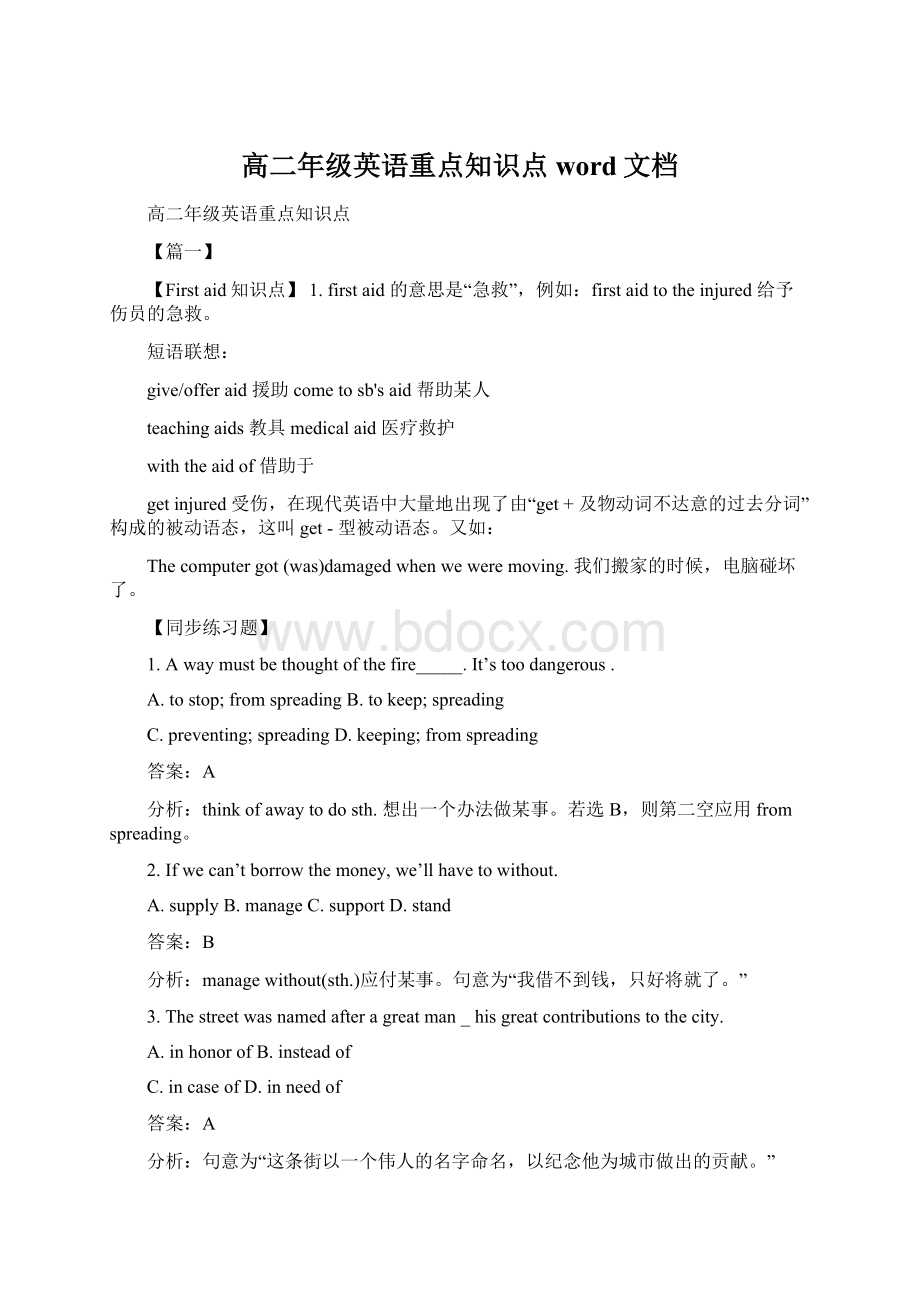高二年级英语重点知识点word文档.docx
《高二年级英语重点知识点word文档.docx》由会员分享,可在线阅读,更多相关《高二年级英语重点知识点word文档.docx(7页珍藏版)》请在冰豆网上搜索。

高二年级英语重点知识点word文档
高二年级英语重点知识点
【篇一】
【Firstaid知识点】1.firstaid的意思是“急救”,例如:
firstaidtotheinjured给予伤员的急救。
短语联想:
give/offeraid援助cometosb'said帮助某人
teachingaids教具medicalaid医疗救护
withtheaidof借助于
getinjured受伤,在现代英语中大量地出现了由“get+及物动词不达意的过去分词”构成的被动语态,这叫get-型被动语态。
又如:
Thecomputergot(was)damagedwhenweweremoving.我们搬家的时候,电脑碰坏了。
【同步练习题】
1.Awaymustbethoughtofthefire_____.It’stoodangerous.
A.tostop;fromspreadingB.tokeep;spreading
C.preventing;spreadingD.keeping;fromspreading
答案:
A
分析:
thinkofawaytodosth.想出一个办法做某事。
若选B,则第二空应用fromspreading。
2.Ifwecan’tborrowthemoney,we’llhavetowithout.
A.supplyB.manageC.supportD.stand
答案:
B
分析:
managewithout(sth.)应付某事。
句意为“我借不到钱,只好将就了。
”
3.Thestreetwasnamedafteragreatman_hisgreatcontributionstothecity.
A.inhonorofB.insteadof
C.incaseofD.inneedof
答案:
A
分析:
句意为“这条街以一个伟人的名字命名,以纪念他为城市做出的贡献。
”
4.Whatwouldhavehappened,asfarastheriverbank?
A.BobhadwalkedfartherB.ifBobshouldwalkfarther
C.hadBobwalkedfartherD.ifBobwalkedfarther
答案:
C
分析:
根据主句的谓语动词“wouldhavehappened”,可以断定此题考查“与过去事实相反”的虚拟语气。
从句中谓语动词用过去完成时,可省去连词if将had前置。
5.Iinsistedtoseeadoctor,butheinsistednothing____wrongwithhim.
A.onhimtogo;shouldbeB.hewent;be
C.hego;wasD.heshouldgo;is
答案:
C
分析:
前一个insist意为“坚持要求;一定要”,接宾语从句时,从句的谓语动词用(should)+do;后一个insist表示“坚持说,坚决认为”,其后接陈述语气的从句,谓语动词用所需的各种时态。
6.Unlessyouwearboots,youmayget___bysnakes.
A.eatenB.brokenC.bittenD.killed
答案:
C
分析:
getbitten被咬伤。
7.Whenthedoctortellsyouto,hemeanstoaskyoutodrawa.
A.breathdeeply;deeplybreathB.breathedeep;breathdeeply
C.breathedeeply;deepbreathD.breathdeep;deepbreathe
答案:
C
分析:
第一空缺少动词,用breathe,被副词deeply修饰;第二空缺少名词,用breath,被形容词deep修饰。
8.Jane’spalefacesuggestedthatsheill,andherparentssuggestedthatsheamedicalexamination.
A.be;shouldhaveB.was;have
C.shouldbe;hadD.was;has
答案:
B
分析:
第一个suggest意为“表明”,接从句时,从句中谓语动词用所需的时态;后一个suggest意为“建议”,接宾语从句时,从句中谓语动词用“(should)+do”。
9.Thechildrenwhentheyrealizedtheywerelost.
A.frightenedB.surprisedC.astonishedD.paniced
答案:
D
分析:
panic:
惊慌;恐慌,A,B,C均为及物动词,与句子结构不吻合。
10.Becarefulwiththatmatch.Thatstraweasily.
A.catchesfireB.isonfireC.setsfireD.setsonfire
答案:
A
分析:
“小心,火柴!
麦秆容易着火。
”强调动作,用catchfire。
Beonfire着火了,强调状态。
setonfire相当于setfireto…放火烧……
Mybikeisgetting(isbeing)repairedrow.我的自行车正在修理。
2.Protect动词,“保护、维护”,用于句式“protect+名词+against/from+名词”。
例如:
e.g.Heiswearingsunglassestoprotecthiseyesfromthestrongsunlight.他带着太阳镜以挡强烈的阳光。
短语联想:
Keep...from...不让/避免
stop...(from)...阻止
prevent...(from)...妨碍/防止
disable...from...使……失去(能力/资格)
save...from...挽救、拯救
3.dependon取决于。
例如:
e.g.Theamountyoupaydependsonwhereyoulive.你付多少取决于你住哪里。
词义拓展
dependon依靠,依赖:
Hisfamilydependsonhim.他的一家人全靠他养活。
依赖,信任:
WearedependingonyoutofinishthejobbyFriday.我们相信你在星期五前能完成这项工作。
4.squeeze动词,意思是“榨取”、“挤出”,例如:
squeezeanorange榨橘子
常用句式
squeeze+名词+out(of/from)+名词,例如:
e.g.Thoseblackmailersintendedtosqueezemoremoneyoutofhim.
那些勒索者打算向他榨取更多的钱。
overandoveragain再三地。
例如:
I’vetoldyouoverandoveragainnottodothat.
【篇二】【TheBritishIsles知识点】
1.NamefiveimportantcitiesintheUnitedKingdom.说出联合王国(即英国)中五座重要城市的名字。
(p.33WarmingUpEx.2)
name动词,意为“说出……的名称(名字);给……取名,命名;任命,提名;决定,说定”等。
如:
①Canyounamealltheplantsandtreesinthisgarden?
你能叫得出这个花园的所有花草树木的名称吗?
②ThecouplenamedthechildDick.这对夫妇给孩子取名迪克。
③Mr.Michaelhasbeennamedasthenewmanager.迈克尔先生被任命为新的经理。
④Pleasenamethedayforourwedding.请(你)决定我们婚礼的日子。
【拓展】name构成的短语:
worth(worthyof)thename名副其实的;inthenameof凭……的;以……的名义;callsb.names辱骂某人;name...after...以……名字命名;namesb.for提名某人担任(某职务);knowsb.byname仅仅知道某人的名字(没有见过面)
2.TheconversationworkshopistaughtonWednesdayafternoon.谈话技巧研讨会的上课时间是星期三的下午。
(p.33ListeningEx.1No.1)
1)上句中workshop的词义并非“车间;工厂;作坊;工作室”之意,而是“研习会,专题学术讨论会”的意思。
2)介词on表示时间的用法:
(1)用在“日期(date),几号”和“星期几”之前。
如:
onJuly1st(=onthefirstofJuly)在7月l号(那一天);
onWednesday在星期三;
onSundays每逢星期天
(2)用在“特定”的早、晚、日间、上午、下午等之间。
如:
onthemorning/afternoon/nightofOct.1st在10月1日的上午/下午/晚上;
onacoldnightinJanuary在一月的一个寒冷的夜晚;
ontheeveofthewar在战争前夕;
onNewYear'sDay在新年(那天)
(3)用在某些动名词之前,作“在……之时”讲。
如:
①Theygreetedusonourarrival.他们在我们到达时迎接了我们。
②I'llshowyouthebookonmyreturn.我一回来就让你看一下这本书。
③Hegotmarriedimmediatelyonhisgraduation.他一毕业就结了婚。
(4)用在某些动名词之前,作“一……就……”讲。
如:
①Onarrivingatmydestination,Iwenttoseemyfriend.一到目的地,我便去看我的朋友。
②Onleavingschool,hewentintobusiness.一毕业,他便经起商来。
③Onhearingthegoodnews,hejumpedwithjoy.一听到这个好消息,他高兴地跳了起来。
(5)和occasion/opportunity等词连用,表示“在某一特殊的时机或场合”。
如:
①Isendyoumybestwishesonthishappyoccasion.值此佳期,我奉上对你最美好的祝愿。
②Iwillhaveawordwithhimonthefirstopportunity.一有机会,我要跟他聊聊。
3.W